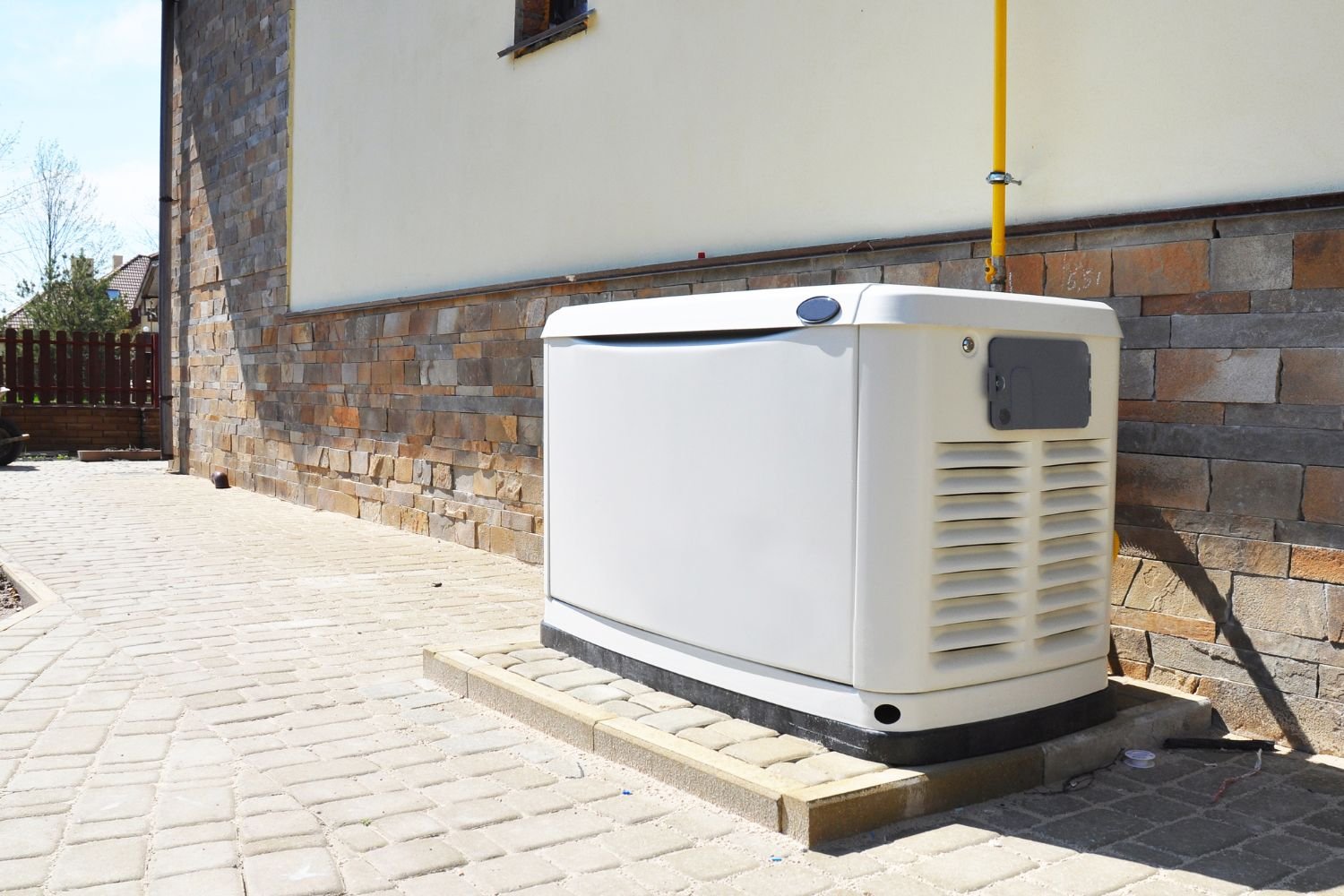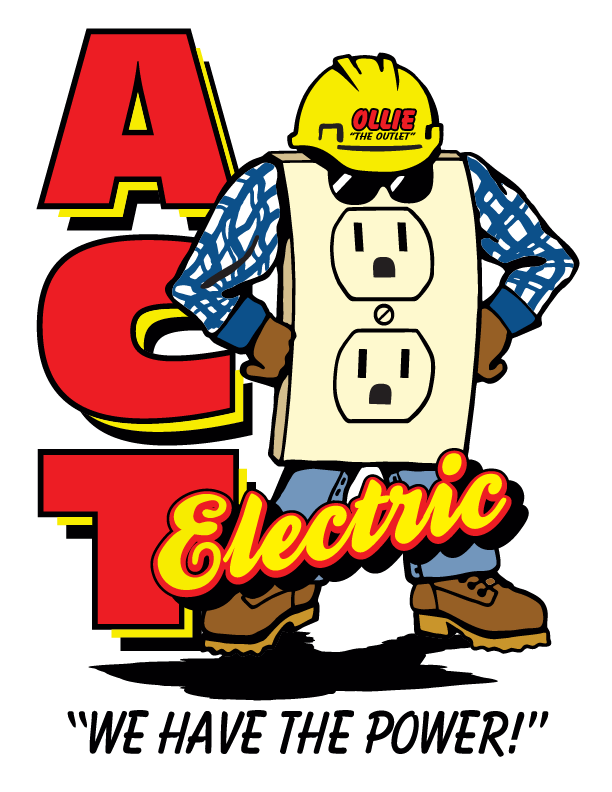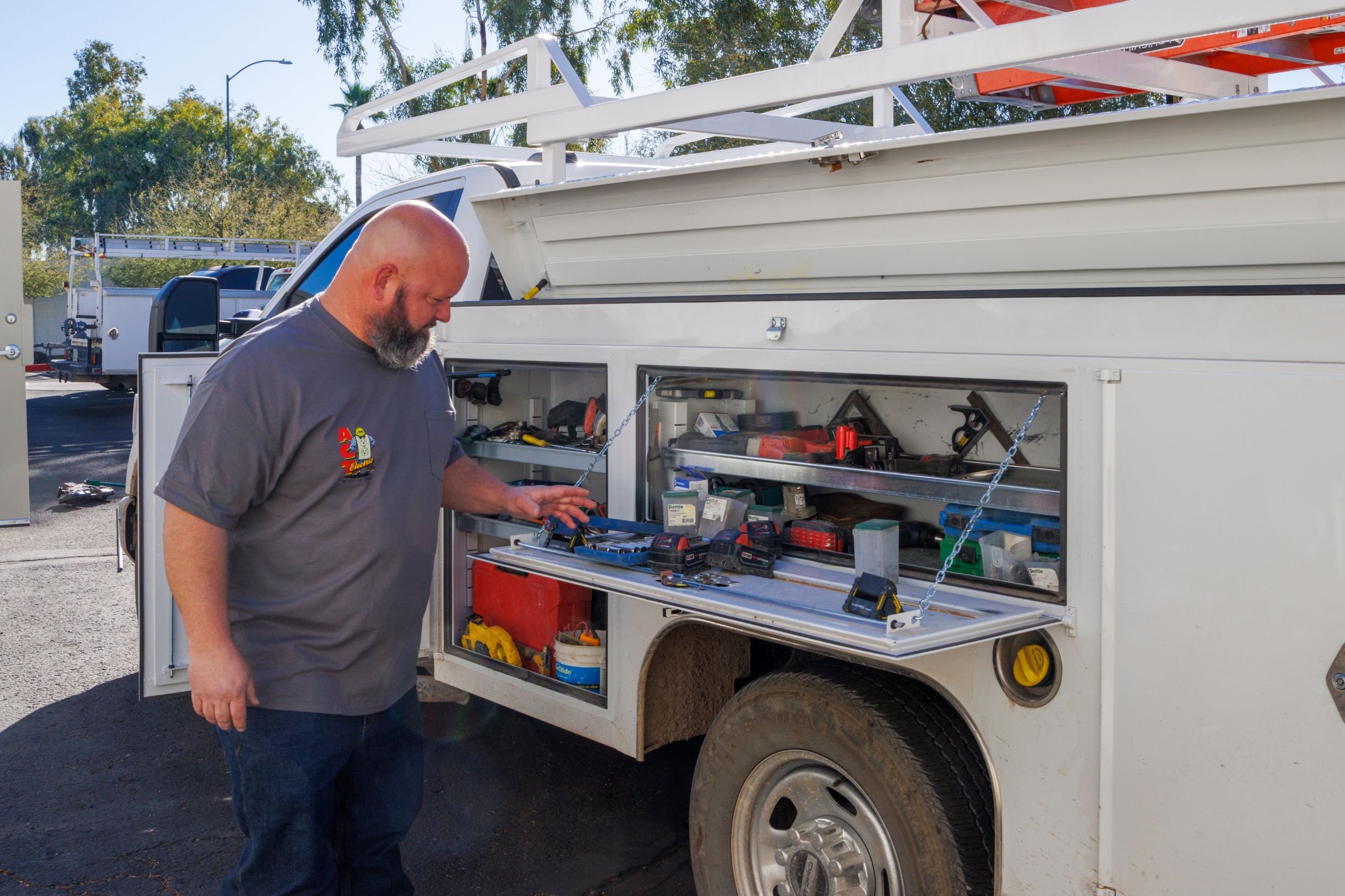
Home Backup Generator Installation in Mesa, AZ
Serving Mesa, Gilbert, Chandler, Tempe, Scottsdale, Paradise Valley, Apache Junction, and Phoenix
The beauty of the desert and the comfort of Mesa, AZ, homes aren’t always in perfect harmony. Cooling and air conditioning, in particular, can take quite a toll on municiple electrical systems, which could cause unexpected power outages. There are other reasons for power outages, so having a power generator could be more of a necessity than convenient.
ACT Electric’s team of professionals can expertly install reliable power generators that avoid interruptions even in unexpected circumstances, no matter the weather outside. Our power generators will keep lights on, air conditioners running, and residents safe. Even when the rest of the neighborhood is left in the dark, the generator will keep the power going for other homeowners.
Benefits of Home Backup Generators in Mesa, AZ
-
Home backup generators provide uninterrupted electricity when the primary power grid fails. These devices automatically activate within seconds of a blackout, maintaining important appliances and systems. Homeowners can continue daily activities without disruption, from keeping food fresh in refrigerators to powering medical equipment. Backup generators offer peace of mind, especially in areas prone to regular or prolonged power outages due to severe weather events or aging infrastructure.
-
Backup generators contribute significantly to home safety during power failures. They keep security systems operational, deterring potential intruders who might otherwise target homes during blackouts. Proper lighting powered by generators reduces the risk of accidents and falls in dark environments. Additionally, these devices maintain communication systems, allowing residents to stay informed about emergency situations and contact authorities if necessary. Generators also support sump pumps, preventing basement flooding and associated property damage.
-
Home backup generators maintain a comfortable living environment during power outages. Air conditioning and heating systems remain functional, preserving ideal indoor temperatures regardless of external conditions. Entertainment devices stay powered, providing distraction and normalcy during extended blackouts. Work-from-home setups remain operational, minimizing disruption to professional responsibilities. Generators also support cooking appliances, allowing families to prepare meals as usual instead of relying on non-perishable foods or takeout options during prolonged outages.
-
Installing a backup generator can significantly increase property value. Potential homebuyers often view this feature as a valuable asset, especially in regions prone to power instability. The presence of a generator can be a deciding factor for buyers comparing similar properties. Furthermore, some insurance companies offer discounts on homeowners' policies for houses equipped with backup power systems, recognizing the reduced chance of damage and claims. This long-term investment in home infrastructure can yield substantial returns in daily life and at the time of resale.
Our Home Generator Options
-
Standby Generators
Standby generators are a cornerstone of uninterrupted home power and a permanent solution for transition during power outages. These powerhouses fit outside a home and automatically kick in when the power goes out, running on natural gas or propane. They handle the energy of nearly any home size and can keep everything from the fridge to the HVAC system running without a hitch.
-
Portable Generators
Portable power generators are ideal for temporary power or use where a permanent generator isn’t feasible. Of course, they may need manual setup and operation, but portable generators can still power the most necessary appliances and systems when they’re needed most. They burn gasoline or propane, so they’re convenient for emergencies, camping, or nature exploring.
-
Whole-Home Generators
Whole-home generators power everything in a home without skipping a beat, so those worried about power love having them. These systems resemble owning a personal power station, ready to take over when the main grid power supply is interrupted. Those who have a whole-home generator hardly notice when the rest of the grid goes down as their life continues unfazed by the outage outside.
Testimonials
Customer experience is our priority.
Finding the Perfect Home Generator in Mesa, AZ
Assess Power Requirements: The first step in choosing the right generator is knowing what that generator should be. For anyone who isn’t sure, our team at ACT Electric will calculate the total wattage necessary to keep all the most significant appliances and systems running and pick a generator that meets those requirements without overspending on unused capacity.
Consider Fuel Options: The type of fuel a generator uses is a major consideration. Natural gas, propane, diesel, and gasoline have several benefits and limitations. Our knowledgeable team will explain the options, considering fuel availability, storage safety, and running costs, to find the best fuel type for each situation.
Evaluate Installation Requirements: Every home is unique, and so are its installation requirements. We know that, so we take care of all the details, like assessing the best location for the generator and complying with local codes and regulations. Our team will install the generator correctly and optimally so it won’t waste more energy than it needs or make excess noise.
Research Features and Technologies: Many generators today have features and technologies that make life easier in situations where power is needed. These include automatic transfer switches, remote monitoring, quiet operation modes, and fuel efficiency features. We’ll help familiarize home or business owners with all these features and technologies to find a modern and user-friendly power generator.

Full-Service Electrical Contractor for Local Residents and Businesses.
Serving Mesa, Gilbert, Chandler, Scottsdale, Guadalupe, Higley, Paradise Valley, Superstition Springs, Apache Junction, Morrison Ranch, Val Vista Lakes, Eastmark, Dobson Ranch, Cadence At Gateway, Leisure World, Las Sendas, Alta Mesa, Red Mountain Ranch, Mulberry, and Surrounding Areas.
Our Mesa Home Backup Generator Installation Process
-
The process starts with a comprehensive assessment of the property's electrical needs and layout. Trained technicians analyze power consumption patterns, identify critical circuits, and evaluate the ideal location for the generator. This step involves discussing specific requirements, such as running essential appliances or powering the entire home. The consultation also covers local zoning laws, permit requirements, and potential noise concerns. By gathering this crucial information, a tailored solution can be designed to meet the individual needs of each household.
-
Based on the consultation findings, appropriate generator options are presented. The selection process considers factors such as fuel type (natural gas, propane, or diesel), power output capacity, and runtime. The generator's size is determined by the electrical load it needs to support. Aesthetic considerations are also considered, such as how well the unit will blend with the property's appearance. Additionally, the selection includes choosing between air-cooled or liquid-cooled models, depending on the specific requirements and budget constraints of the homeowner.
-
The installation phase begins with obtaining necessary permits and scheduling the work. A concrete pad is prepared to deliver a stable foundation for the generator. The team then sets up the automatic transfer switch, facilitating seamless power transition during outages. Fuel lines are connected, and electrical wiring is installed to integrate the generator with the home's electrical system. This process involves thorough coordination between electricians, plumbers, and HVAC specialists to guarantee a safe and efficient setup that complies with all local codes and regulations.
-
After installation, thorough testing is conducted to verify the generator's performance. This includes simulating power outages to confirm the automatic transfer switch functions correctly. The generator's output is measured to guarantee it meets the home's power needs. Fine-tuning of voltage and frequency settings is performed to optimize performance. The activation process involves programming the generator's self-test schedule and instructing homeowners on essential operation and maintenance procedures. A final check is carried out to certify the installation meets all safety standards and manufacturer specifications.
Why Choose ACT Electric for Home Backup Generator Installation in Mesa
-
Certified Technicians
ACT Electric employs a team of highly trained and certified technicians specializing in home backup generator installations. These professionals undergo rigorous training and stay updated with industry standards and technologies. Their expertise covers various generator brands and models, allowing them to handle diverse installation scenarios efficiently. The technicians' certifications demonstrate their commitment to quality workmanship and adherence to safety protocols. With years of experience in the Mesa area, these experts are well-versed in local regulations. They can navigate permit processes smoothly, providing homeowners peace of mind throughout installation.
-
Comprehensive Services
ACT Electric offers a full spectrum of services related to home backup generators. The company provides end-to-end solutions, from initial consultations and site assessments to installation, maintenance, and repairs. Their services include power load calculations, generator sizing, fuel source connections, and integration with existing electrical systems. ACT Electric also handles all necessary paperwork and permit acquisitions, streamlining the process for homeowners. Post-installation, the company provides thorough system testing and offers ongoing maintenance plans to keep generators in optimal condition, maximizing the reliability and longevity of the equipment.
-
Personalized Solutions
ACT Electric recognizes that each home has unique power needs and structural considerations. The company uses a customized approach to every installation project, tailoring solutions to household requirements and preferences. Factors such as power consumption patterns, critical appliances, and budget constraints are carefully evaluated to recommend the most suitable generator options. The team works closely with homeowners to create systems that seamlessly integrate with existing home aesthetics and layouts. This personalized approach extends to selecting appropriate fuel types and determining optimal functionality and visual appeal placement.
-
Transparent Communication
ACT Electric prioritizes clear and open communication throughout the generator installation. Detailed explanations of available options, associated costs, and expected timelines are provided upfront. The company regularly updates project progress, keeping homeowners informed at every stage. Any potential challenges or necessary modifications are promptly discussed, allowing for collaborative decision-making. ACT Electric provides comprehensive documentation, including warranties, operational guidelines, and maintenance schedules. This commitment to transparency fosters trust and confidence, enabling homeowners to make informed decisions about their backup power solutions.
ACT Electric - Mesa’s Top-Rated Home Generator Installation Experts
Partnering with ACT Electric means joining forces with one of Mesa’s leading experts in home generator installation. Our work is always of top quality, reliability, and customer satisfaction and our happy customers vouch for our quality and knowledge. Be prepared for whatever comes your way in this beautiful but challenging desert environment by giving us a call and letting us handle every part of the power generator installation.
-
What is a home backup generator?
A home backup generator is a system designed to provide power to a home during electrical outages, ensuring that essential appliances and systems continue to operate.
Why should I install a home backup generator in Mesa, AZ?
A home backup generator ensures there is power during outages, which is crucial for maintaining comfort and safety and operating essential systems like heating, cooling, and refrigeration.
What types of Mesa home backup generators are available?
Types include portable generators, standby (whole-house) generators, and inverter generators. Standby generators are typically installed permanently and automatically start during an outage.
What is the distinction between a portable generator and a standby generator?
Portable generators can be moved and used as needed, while standby generators are permanently installed, connect directly to a home’s electrical system, and automatically turn on during an outage.
How does a standby generator work?
A standby generator automatically detects power loss, starts up, and supplies electricity to a home through a transfer switch that disconnects from the utility grid.
How do I determine the size of the generator I need?
The size depends on the home’s power requirements, including essential appliances and systems you want to support during an outage. We can perform a load assessment to determine the appropriate size.
What are the benefits of a home backup generator in Mesa, AZ?
Benefits include uninterrupted power during outages, protection for sensitive electronics, increased home security, and peace of mind knowing you’re prepared for emergencies.
Can a generator power my entire home?
Yes, a whole-house generator can power an entire home, depending on its size and capacity. We can help you select a generator that meets your specific needs.
What is the difference between a manual and an automatic transfer switch?
A manual transfer switch requires you to manually switch from utility power to generator power, while an automatic transfer switch does this automatically when it detects a power outage.
What maintenance is required for a Mesa home backup generator?
Regular maintenance includes checking oil levels, inspecting filters, running the generator periodically, and scheduling annual professional maintenance.
What is involved in the installation of a home backup generator in Mesa, AZ?
Installation involves selecting the generator, preparing the site, connecting the generator to the electrical system, installing the transfer switch, and testing the system.
How long does it take to install a home backup generator in Mesa, AZ?
Installation time varies depending on the generator size and complexity but typically takes 1-3 days. We provide a detailed timeline during the consultation process.
Do I need a permit to install a home backup generator in Mesa, AZ?
Yes, permits are usually required for generator installation to confirm compliance with local codes and safety regulations. We handle the permit process.
Where should the generator be installed?
Generators should be installed in a well-ventilated area away from windows, doors, and living spaces to ensure proper exhaust and avoid carbon monoxide buildup.
Can a home backup generator be installed in a garage or basement?
No, generators should not be installed in enclosed spaces such as garages or basements due to the risk of carbon monoxide poisoning. They should be placed outdoors in a well-ventilated area.
How do I prepare my home for generator installation?
Prepare by clearing the installation area, ensuring access to electrical panels, and discussing any specific requirements or preferences with us.
What are the electrical requirements for installing a generator?
The generator must be connected to a home’s electrical system through a transfer switch. Electrical requirements include appropriate wiring, breaker panel capacity, and grounding.
Can the installation be done during any season?
Yes, generator installations can be performed year-round. However, scheduling may be affected by weather conditions or peak seasons, so it’s best to plan.
How much space is needed for generator installation in Mesa, AZ?
Space requirements vary based on the generator’s size but generally include clearances for ventilation and maintenance access. We’ll assess the site to ensure adequate space.
What factors affect the cost of installing a home backup generator?
Factors include generator size, installation complexity, electrical requirements, and site preparation. We provide a detailed estimate based on your specific needs.
How much does it cost to install a home backup generator?
Costs vary widely based on generator size, installation complexity, etc. We provide a detailed estimate to help you understand the total cost of installation.
Are there any additional costs associated with generator installation?
Additional costs may include site preparation, electrical upgrades, and permit fees. We outline all potential costs in the estimate.
Can I get a discount for purchasing a generator and installation together?
We may offer discounts or promotions for bundled purchases. Contact us to inquire about current offers and potential savings.
How can I stay within budget for a generator installation project?
Obtain a precise estimate, prioritize essential features, and discuss the budget with us to ensure the project aligns with your financial plan.
What factors influence the cost of a home backup generator?
Factors include generator type, size, installation complexity, site preparation, and additional features or accessories. We provide a comprehensive estimate to outline these factors.
How do I get a detailed estimate for generator installation?
Contact us to schedule a consultation. We will assess your needs, provide a detailed estimate, and discuss the scope of work.
What should I do if the final cost of the project exceeds the estimate?
Discuss any budget concerns with us as soon as possible. We can adjust the project scope or provide solutions to manage costs effectively.
Are there any tax incentives or rebates for installing a home backup generator?
Some local or federal programs may offer incentives for generator installations. We can provide information on available incentives and how to apply for them.
What long-term savings can I expect from installing a home backup generator in Mesa, AZ?
Long-term savings include protection from power outages, reduced potential for food spoilage, and enhanced home security, leading to peace of mind and possible cost savings in emergencies.
How often should I perform maintenance on my home backup generator?
Regular maintenance is recommended every 6 to 12 months, including checking oil levels, inspecting filters, running the generator, and scheduling annual professional servicing.
What are common issues with home backup generators, and how can they be fixed?
Common issues include fuel problems, battery failure, and operational malfunctions. Troubleshooting may involve checking fuel levels, battery condition, and conducting routine inspections.
How can I clean my home backup generator?
Turn off the generator and allow it to cool. Clean the exterior with a dry cloth and remove debris around the unit. Ensure the air intake and exhaust are clear.
What should I do if my generator doesn’t start?
Check the fuel level and battery condition, and ensure the generator is properly connected. If the issue persists, reach us for professional diagnosis and repair.
How can I test my backup generator to ensure it’s working correctly?
Perform a weekly or monthly test run to ensure the generator starts and operates correctly. Follow the manufacturer’s instructions for testing procedures.
What should I do if my generator is making unusual noises?
Unusual noises may indicate mechanical issues or loose components. Inspect the generator and contact us for professional evaluation and repair if needed.
How can I prevent issues with my backup generator?
Perform regular maintenance, keep the generator clean, ensure proper ventilation, and address any issues promptly to prevent problems.
What should I do if the generator is not providing enough power?
Verify the generator’s capacity and ensure that it is not overloaded. Check connections and wiring. If issues persist, contact us for professional assessment and adjustment.
How can I confirm my generator is ready for use during an emergency?
Perform regular maintenance, test cycles, and keep the generator in good working condition. Ensure that fuel levels are sufficient and that the unit is accessible.
What should I do if there is an issue with the transfer switch?
Inspect the transfer switch for any visible issues and ensure it is properly connected. Contact us for professional inspection and repair of the transfer switch if needed.
How do I operate my home backup generator safely?
Follow the manufacturer’s operating instructions, keep the generator outdoors in a well-ventilated area, and never operate it indoors or in enclosed spaces.
What safety precautions should I take when using a home backup generator?
Ensure proper ventilation, use the generator on a stable surface, avoid overloading, and keep flammable materials away. Install carbon monoxide detectors in your home.
How can I ensure my generator is properly grounded?
Proper grounding is essential for safety and operational effectiveness. We ensure that the generator is correctly grounded during installation.
What should I do in case of a carbon monoxide leak from the generator?
Immediately move to fresh air and contact emergency services. Ensure the home is fitted with carbon monoxide detectors and that the generator is placed in a safe location.
How do I handle fuel for my generator?
Store fuel in approved containers, keep it in a cool, dry place, and never refuel the generator while running. Follow safety guidelines for fuel handling.
Can I use extension cords with my home backup generator?
Yes, but use heavy-duty extension cords rated for the generator’s power output. Connect the cords to the generator and appliances, ensuring they are correctly rated and in good condition.
How do I know if my generator meets local code requirements?
We ensure that all installations comply with local building codes and regulations. If you have specific concerns, we can verify compliance.
What should I do if my generator’s warranty is about to expire?
Review the warranty terms, ensure all maintenance has been performed, and contact us for any required inspections or services before the warranty expires.
Can I add more appliances to my generator load after installation?
Yes, but you must ensure that the generator’s capacity can handle the additional load. We can help assess and adjust the generator’s capacity as needed.
How can I integrate a backup generator into a smart home system?
Integrating a generator into a smart home system may involve using intelligent controls and monitoring systems. We can help you explore options for connectivity and integration.


